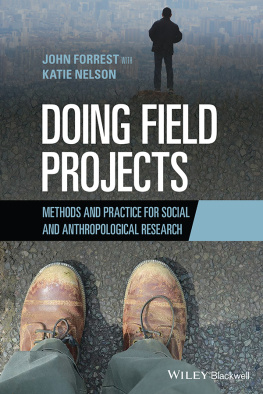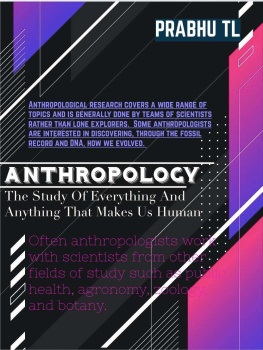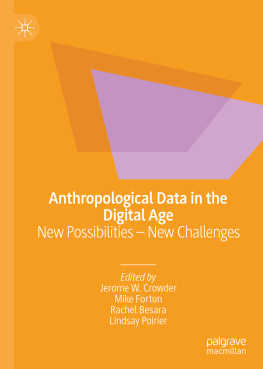In the Field
ALSO BY
George Gmelch and Sharon Bohn Gmelch
Irish Travellers: The Unsettled Life
Tasting the Good Life Wine Tourism in the Napa Valley
The Parish behind Gods Back: The Changing Culture of Rural Barbados
George Gmelch
Playing with Tigers: A Minor League Chronicle of the Sixties
Inside Pitch Life in Professional Baseball
The Irish Tinkers: The Urbanization of an Itinerant People
Behind the Smile: The Working Lives of Caribbean Tourism
Double Passage: The Lives of Caribbean Migrants Abroad and Back Home
Urban Life (with P. Kupinger)
In the Ballpark (with J.J. Weiner) The Working Lives of Baseball People
Baseball beyond Our Borders (with D. Nathan)
J.M. Synge in Wicklow, West Kerry & Connemara (with A. Saddlemyer)
To Shorten the Road (with B. Kroup): Folktales from Ireland's Travelling People
Sharon Bohn Gmelch
Nan: The Life of an Irish Travelling Woman
The Tlingit Encounter with Photography
Irish Life and Traditions
Gender on Campus
Tourists and Tourism (with A. Kaul)
Tinkers and Travellers (photographs by P. Langan and G. Gmelch)
In the Field
Life and Work in Cultural Anthropology
George Gmelch and Sharon Bohn Gmelch
UNIVERSITY OF CALIFORNIA PRESS
University of California Press, one of the most distinguished university presses in the United States, enriches lives around the world by advancing scholarship in the humanities, social sciences, and natural sciences. Its activities are supported by the UC Press Foundation and by philanthropic contributions from individuals and institutions. For more information, visit www.ucpress.edu.
University of California Press
Oakland, California
2018 by The Regents of the University of California
Library of Congress Cataloging-in-Publication Data
Names: Gmelch, George, author. | Gmelch, Sharon, author.
Title: In the field : life and work in cultural anthropology / George Gmelch and Sharon Bohn Gmelch.
Description: Oakland, California : University of California Press, [2018] | Includes bibliographical references and index. |
Identifiers: LCCN 2017050751 (print) | LCCN 2017056498 (ebook) | ISBN 9780520964211 (ebook) | ISBN 9780520289611 (cloth : alk. paper) | ISBN 9780520289628 (pbk. : alk. paper)
Subjects: LCSH : AnthropologyFieldwork. | EthnologyMethodology.
Classification: LCC GN 346 (ebook) | LCC GN 346 . G 54 2018 (print) | DDC 306.072/3dc23
LC record available at https://lccn.loc.gov/2017050751
27 26 25 24 23 22 21 20 19 18
10 9 8 7 6 5 4 3 2 1
Contents
Illustrations
2-1.
2-2.
2-3.
2-4.
2-5.
3-1.
3-2.
3-3.
4-1.
4-2.
4-3.
5-1.
5-2.
5-3.
6-1.
6-2.
6-3.
6-4.
7-1.
7-2.
8-1.
8-2.
8-3.
8-4.
9-1.
9-2.
9-3.
9-4.
9-5.
9-6.
10-1.
10-2.
10-3.
10-4.
11-1.
11-2.
11-3.
12-1.
12-2.
12-3.
12-4.
Acknowledgments
During the decade this book was in progress, many people advised and assisted us. Early on, Tom Curtin, Richard Nelson, and Kenji Tierney helped us understand what a book needed to do to invite student readers into the world of cultural anthropology.
We are also indebted to Karen Brison, Lucia Cantero, Rob Elias, Morgan Gmelch, Jerry Handler, Rabia Kamal, Steve Leavitt, Chris Loperena, John Nelson, Craig Root, Diane Royal, John Ziegler, and Rue Ziegler, who were always ready sounding boards and who contributed new perspectives. Katharine (Kat) Beal, Constance Clement, Maria Delgado, and Howard DeNike were superstar editors. Kat and Maria, together with Jacqueline Cepeda who also read the entire manuscript, added a valuable student perspective. Colleagues, friends, and relatives who were too kind to say no when asked if they were willing to read a particular chapter include Judy Adler, Matt Barg, Jim Eder, Ellen Frankenstein, Larry Hill, Terry Hill, Jan Holmes, Anthony Howarth, Noboku Kinoshita, Joanna LaFrancesca, Debbie Miller, Barbara Neis, Richard Nelson, Nicole Power, Sharon Roseman, Jack Stuster, and Adrian Tanner. They served as informal fact checkers and gave us good advice on what passages to keep and what to excise.
Seth Dobrin, Renee Donovan, and Kate Marshall, our editors at UC Press, provided wise counsel. Ten anonymous reviewers made valuable early suggestions that we took to heart and that have made this a better book. We are also grateful to Bradley Depew who shepherded the manuscript through the production process and to Anthony Chiffolo for his careful copyediting.
We owe thanks to our former field-school students, especially Chris Berk, Johanna Campbell, Carolyn Canetti, Pat DiCerbo, Ellen Frankenstein, and Pearl Jurist-Schoen for digging into their memories to help us reconstruct our times together. Our son, Morgan, also played an important role in this regard. We also wish to thank our anthropology colleagues at the University of San Francisco and Union College for providing a nurturing atmosphere for scholarship. Finally, our deepest gratitude goes to the many people in Ireland, England, Barbados, Tasmania, Tanzania, Alaska, and Japan who over the decades assisted us in our fieldwork, giving us their time and trust. Their lives and their stories opened new windows onto the world.
To Richard K. Nelsonanthropologist, nature writer, conservationist, and lifelong friend. And for our son, Morgan, and the many students who have accompanied us to the field over the years.
The Fieldwork Tradition
This book offers a personal and humanistic glimpse of the life and work of cultural anthropology. Many manuals or how to books on fieldwork are available. Our aim instead is to explore what being an anthropologist and doing fieldwork are like. We tell stories from our own experiences as well as recount some from the many students we have taught over the years. By doing so we hope to convey the range of topics anthropologists study and the different kinds of research they do. We describe the strategies and techniques we used to gather data, some of our findings, and the problems and pleasures of doing fieldwork. We hope these stories impart a sense of the anthropological approach to knowledge as well as the excitement and challenge of living in and learning from other cultures. The chapters that follow include experiences in diverse cultures, with representatives from Africa, Asia, Europe, North America, and the Caribbean.
THE FIELD
The field refers to the cultural setting where anthropologists do their research. Until a few decades ago, this was usually a non-Western place and involved living among tribal or peasant peoples. Typically, fieldwork meant moving into a village, learning the language, gaining rapport, and living as closely as possible to the way of the natives for at least a year. Many anthropologists still go to distant and unfamiliar places to do this kind of fieldwork, but today the field can be just about anywhere, from a village in Kenya to a New York City street corner, an ethnic enclave in Paris, or the corridors of a transnational corporation. It can also refer to more than one place, since more and more research requires or benefits from a multisited approach. Now it is common among scholars studying migration, for example, to do fieldwork in both the migrants home society and their destination communities. Regardless of geographic location or cultural group, however, the notion of the field or being in the field is symbolically and emotionally laden. Doing fieldwork remains a rite of passage in anthropology, turning graduate students into professionals.








